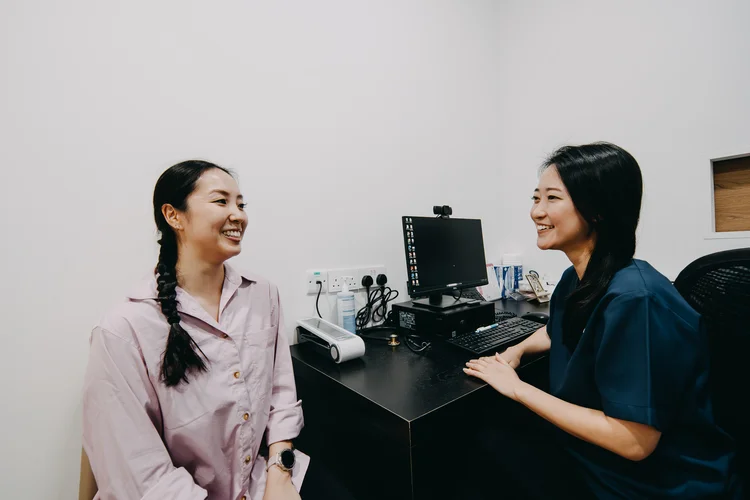HPV Test Singapore
| Test Options | HPV Test (DNA with Genotype 16 & 18) Swab Test |
| Treatment | No cure for HPV, but treatments available for conditions caused by HPV |
| Price |
HPV Test (DNA with Genotype 16 & 18) Swab Test:
|
| Appointment Options |
Same-day appointment (subject to availability). Book via WhatsApp: 8893 3757 or email: hello@healthscreening.sg |
| Clinic Locations |
Orchard: 1 Orchard Blvd
#05-09 Camden Medical Centre, S248649 Tanjong Pagar: 72 Anson Rd #01-02 Anson House, S079911 |
What Is HPV?
Human Papillomavirus (HPV) is one of the most common viruses in the world, affecting the majority of sexually active people at some stage in their lives. With over 100 strains, its impact varies widely:
- High-risk strains (like HPV 16 and 18): These are the more dangerous types, known for their role in causing cancers such as cervical, vulvar, vaginal, and throat cancers.
- Low-risk strains: While less harmful, these can result in genital warts or benign skin warts on the hands and feet.
HPV in Singapore
HPV poses a significant public health concern, particularly due to its association with cancer. In Singapore, 1 in 10 healthy women are infected with HPV, being most common among those aged 20 to 24. Additionally, 1 in 2 women infected carry a high-risk strain associated with cervical cancer.

HPV Symptoms & Complications
HPV infections are often asymptomatic, especially those caused by high-risk strains. Many individuals
may not notice any symptoms. When symptoms do appear, they can include various types
of warts, such as genital warts, flat warts, or plantar warts.
In some instances, the immune system is unable to clear a high-risk HPV infection. Over time, this
persistent infection can cause healthy cells to become abnormal, significantly increasing the risk of
developing cancer.
How Does HPV Spread?
HPV spreads mainly through intimate skin-to-skin contact. This includes vaginal, anal, or oral sex with an infected person, as well as direct contact with infected areas (such as warts or broken skin) or contaminated surfaces. Key risk factors include:
- Having multiple sexual partners or a partner with high sexual exposure.
- A weakened immune system, which may result from conditions like HIV/AIDS or the use of immunosuppressive medications.
What Is an HPV Test?
An HPV test is a straightforward
procedure which involves inserting a speculum into the vagina to gently open the cervix,
followed by collecting cervical cells with a soft brush. Most patients experience little to no
discomfort during the process. The sample is then sent to a laboratory for analysis to identify
the presence of HPV strains.
At healthscreening.sg, an HPV test typically takes less than 30
minutes during off-peak hours. Your doctor will first consult with you to discuss the
procedure and address any questions.

HPV Test vs. PAP Smear
A PAP smear checks cervical cells for any abnormalities or precancerous changes, while an HPV test specifically detects high-risk HPV strains that can lead to these abnormalities. When used together, these tests provide a more thorough and effective screening for cervical cancer, helping to identify both existing cell changes and potential future risks.
Can HPV be cured?
There is currently no cure for HPV itself, but in most cases, the body's immune system clears the virus naturally within two years. However, medical interventions are available to address conditions caused by the virus. These include the removal of genital warts, management of precancerous cell changes, and treatment for HPV-related cancers if they develop.
How Often Should I Do an HPV Test?
In Singapore, sexually active women aged 30 and above are advised to undergo HPV testing every five years. A PAP smear is recommended every three years to detect abnormal cervical cell changes early. Combining these tests at the right intervals ensures thorough cervical cancer screening. It is important to consult a doctor, who can recommend the most suitable screening schedule based on your personal risk factors.

HPV Prevention
Preventing HPV requires a proactive approach that combines vaccination and regular screening to reduce the risk of HPV-related complications:
- Vaccination: HPV vaccines, such as Gardasil® 9, provide significant protection against multiple HPV strains, including those linked to cancers and genital warts.
- Regular Screening: Routine HPV testing aid in detecting high-risk infections early, allowing for timely medical intervention.
HPV Test Cost
At healthscreening.sg, we offer testing and vaccination for HPV, with the subsidies and prices as follows:
| Test/Vaccination | Price* |
|---|---|
| HPV Tests | |
| Walk-In | $221.27 |
| CHAS Green/Non-CHAS | $5 |
| CHAS Blue/Orange | $2 |
| Merdeka Generation/Pioneer Generation | $0 |
| Women Wellness Health Screening | From $152 |
| HPV Vaccination | |
| Cervarix 2 | $96/dose (MediSave-claimable) |
| Cervarix 2 (CHAS Blue/Orange) | $23/dose |
| Cervarix 2 (CHAS Green/Singaporeans) | $45/dose |
| Gardasil 9 | $250/dose |
*Prices are NETT and inclusive of GST.
^Prices last updated on
Jan 28, 2026. While every effort is made to keep pricing information up to date, please contact our team to confirm the latest rates.
Please feel free to contact us if you are unsure about your eligibility for subsidies.
Preparing for an HPV Test
To ensure accurate results, avoid the following for 48 hours before your test:
- Sexual intercourse
- Douching
- Vaginal medications
- Spermicidal products
Where to Do an HPV Test?
STD Test in Singapore
Regular STD screening is a crucial part of maintaining your overall health, particularly for sexually active individuals, including those with multiple partners. Early detection of sexually transmitted diseases can prevent serious health complications and ensure timely treatment. At healthscreening.sg, we offer comprehensive STD testing to help you take charge of your sexual health and safeguard your future well-being.
Why Choose Us?








Navigate Easy With Google Maps
Health Screening Singapore (Anson House)
Nearest MRT: EW15 Tanjong PagarHealth Screening Singapore (Camden Medical Centre)
Nearest MRT: TE13 Orchard BoulevardHealth Screening Singapore (CPF Jurong Building)
Nearest MRT: NS1/EW24 Jurong EastFrequently Asked Questions (FAQ)
HPV is extremely common in men, with almost 1 in 3 estimated to be infected globally at any given time. Most infections are asymptomatic and resolve naturally, but certain strains can cause genital warts or lead to cancers, including penile, anal, and throat cancers.
If your partner tests positive for HPV, it doesn't necessarily mean you will develop complications. Most HPV infections are cleared naturally by the immune system. However, it’s advisable to discuss with your doctor whether you need screening or vaccination.
An HPV test is generally painless. However, some individuals may experience mild discomfort or pressure temporarily during the collection of cervical cells.
HPV testing for men can be conducted using anal swabs, urethral swabs, or oral swabs in specific cases, particularly for those at higher risk of HPV-related cancers. Consulting a doctor is recommended to determine the appropriate testing based on individual risk factors.
No, HPV does not typically show up on standard STD tests or panels. Detecting HPV requires specific tests designed to identify the virus.
HPV tests are generally accurate, but false positives or negatives can occasionally occur. This may happen due to factors such as insufficient sample collection, a transient infection that has already cleared, or errors in laboratory analysis. Regular screenings and follow-up tests can help ensure accurate results.
An HPV test identifies high-risk HPV strains in cervical cells. For women, a soft brush is used to collect a sample from the cervix, which is then analysed in a laboratory to detect the virus's genetic material.
HPV testing is usually done by collecting a sample of cervical cells, which is then analysed to detect high-risk HPV strains.
In Singapore, women are recommended to undergo HPV testing every five years as part of routine health screening.
Yes, regular HPV testing is still necessary even after vaccination. While vaccines like Gardasil® 9 protect against several high-risk HPV strains, no vaccine covers all types. Screening ensures early detection of any high-risk infections or cervical cell changes not covered by vaccination.
The cost of an HPV test in Singapore varies. At healthscreening.sg, we offer HPV testing and vaccination with subsidies for eligible individuals under the Community Health Assist Scheme (CHAS), Pioneer Generation (PG), and Merdeka Generation (MG). For those eligible, the cost of testing ranges from $0 to $5, depending on the subsidy tier.
HPV tests in Singapore are commonly done during cervical screenings at clinics, hospitals, or GP clinics. At healthscreening.sg, we provide HPV testing and vaccination with subsidies for eligible individuals under CHAS, Pioneer Generation (PG), and Merdeka Generation (MG), with testing costs ranging from $0 to $5 for eligible individuals.
Yes, many GPs in Singapore offer HPV testing as part of women’s health services. At healthscreening.sg, we offer HPV testing and vaccination with subsidies for eligible individuals under CHAS, Pioneer Generation (PG), and Merdeka Generation (MG), with testing price ranging from $0 to $5 for those eligible.
A PAP smear checks cervical cells for abnormalities or precancerous changes, while an HPV test identifies high-risk HPV strains that can lead to these changes. These tests complement each other as part of cervical cancer screening. At healthscreening.sg, we offer both Pap smear and HPV testing, with subsidies available for eligible individuals under CHAS, Pioneer Generation (PG), or Merdeka Generation (MG).
Both tests serve distinct purposes and complement each other in cervical cancer screening. An HPV test identifies high-risk strains of the virus, while a PAP smear detects abnormal or precancerous changes in cervical cells.
Globally, almost 1 in 3 men are infected with HPV, and it is likely that this statistic translates to Singapore as well. HPV is widespread among sexually active individuals, but vaccination and regular screenings play a vital role in reducing HPV-related complications.
In Singapore, HPV testing is usually conducted by a doctor. At healthscreening.sg, we provide HPV testing and vaccination with subsidies for eligible individuals under CHAS, Pioneer Generation (PG), and Merdeka Generation (MG). For those eligible, the cost of testing ranges from $0 to $5.
HPV testing in Singapore is free for eligible women under the Pioneer Generation (PG) and Merdeka Generation (MG) schemes. For Community Health Assist Scheme (CHAS) cardholders, the subsidised cost ranges from $2 to $5, depending on the specific CHAS tier.
If your HPV test is positive, your doctor may recommend follow-up tests, such as a PAP smear or colposcopy, to assess any cellular changes. Regular monitoring will help track these changes, and treatments are available to manage related issues like genital warts or abnormal cell changes.
Most HPV infections are asymptomatic, meaning they show no noticeable signs. However, when symptoms do appear, they may include genital warts, flat warts, or plantar warts.
The only way to confirm an HPV infection is through specific tests. For women, this may include an HPV DNA test or a PAP smear. For men, targeted swabs can be conducted in certain cases, such as for those at higher risk.
Yes, HPV testing is crucial for identifying high-risk strains that can lead to serious complications, including cervical, anal, penile, throat, and other cancers. Early detection through testing enables timely intervention, significantly reducing the risk of these conditions.
An HPV test is generally not painful. However, some individuals may experience mild pressure or temporary discomfort during the procedure.
Testing positive for HPV indicates that you have been exposed to the virus, which is commonly transmitted through intimate skin-to-skin contact. While a healthy immune system often clears the infection naturally, your doctor may recommend additional tests and close monitoring to detect and manage any potential cellular changes.
